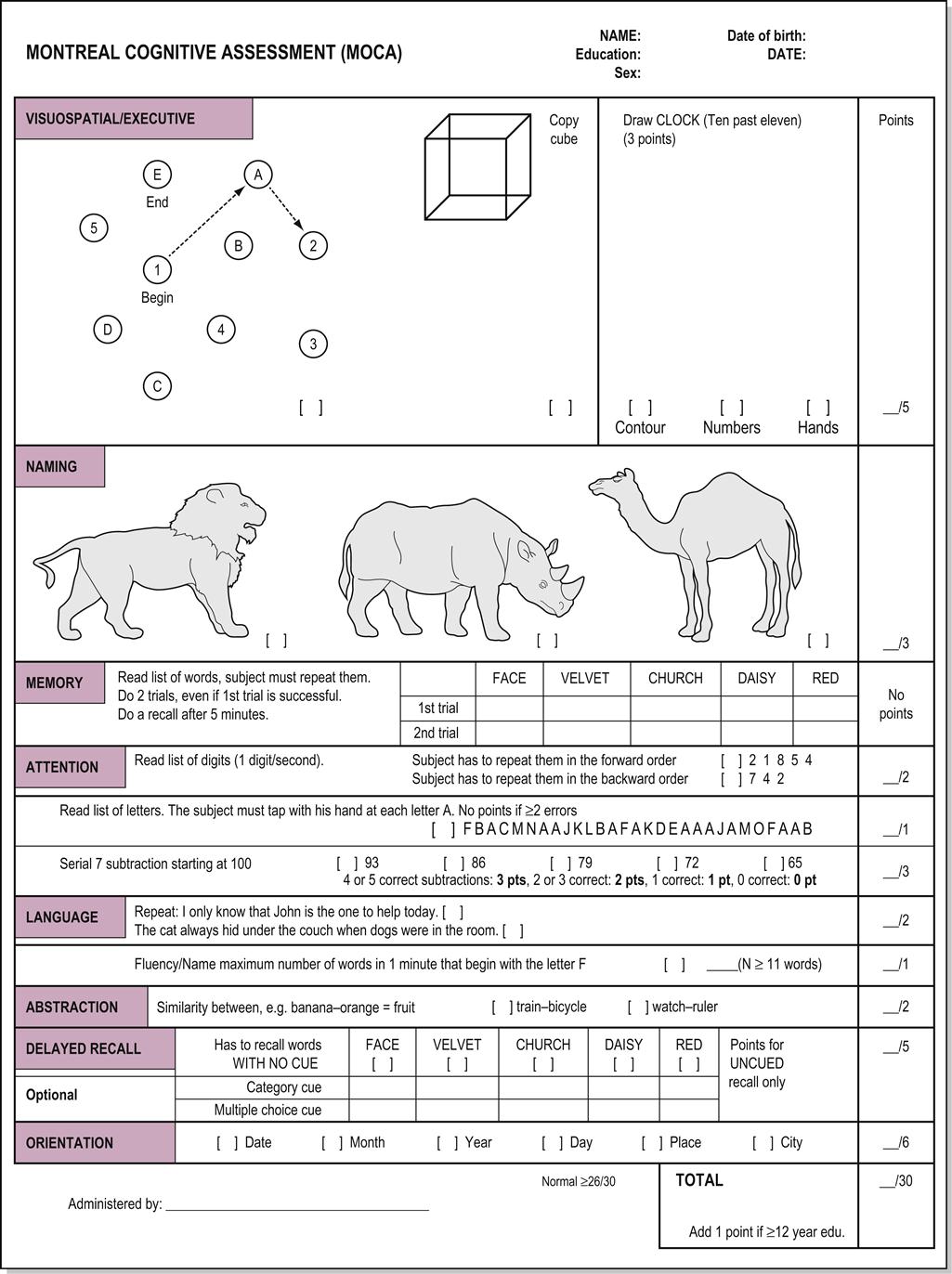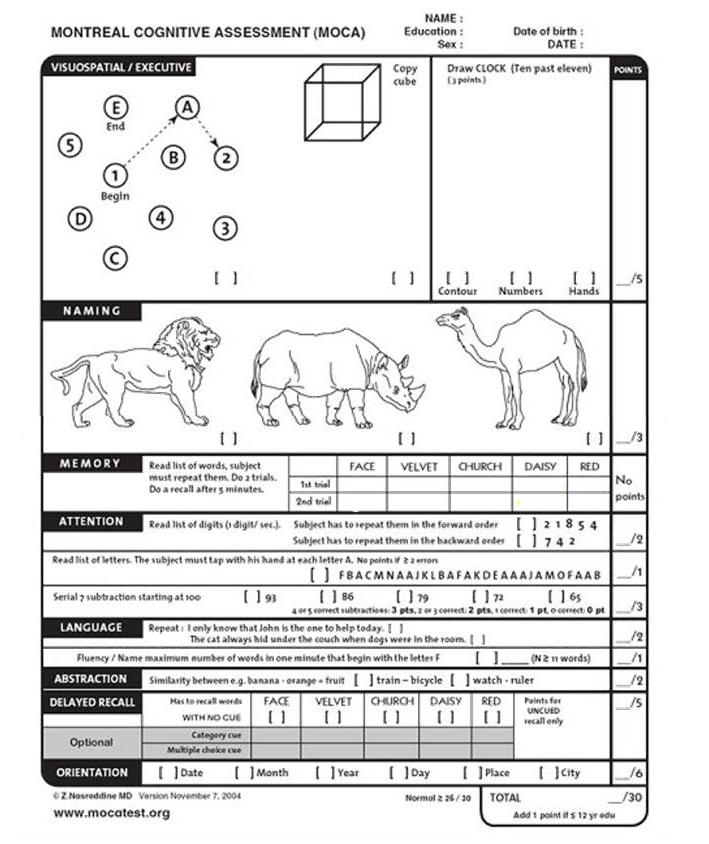The Montreal Cognitive Assessment (MoCA) is a widely-used screening tool that helps doctors evaluate cognitive impairment. The assessment measures a person’s cognitive abilities in several areas, including memory, attention, language, and executive function. The MoCA test has become increasingly popular because it can detect cognitive decline early on and can help identify people who may be at risk for developing dementia or other neurological conditions.
Take the Montreal Cognitive Assessment that Trump took

What is the Montreal Cognitive Assessment?
 The Montreal Cognitive Assessment is a brief screening tool that takes approximately 10 minutes to complete. The test consists of a variety of tasks that assess different aspects of cognitive function, including memory, attention, language, and spatial abilities. The MoCA test was originally designed to identify early signs of mild cognitive impairment, which is a condition that can lead to dementia.
The Montreal Cognitive Assessment is a brief screening tool that takes approximately 10 minutes to complete. The test consists of a variety of tasks that assess different aspects of cognitive function, including memory, attention, language, and spatial abilities. The MoCA test was originally designed to identify early signs of mild cognitive impairment, which is a condition that can lead to dementia.
The MoCA test is typically administered by a healthcare professional, such as a doctor, nurse, or psychologist. Patients are given a series of tasks that test their cognitive abilities, including:
- Short-term memory recall
- Visual-spatial abilities
- Attention and concentration
- Language abilities
- Executive function
Each task is scored out of a certain number of points, and the total score is out of 30. A score of 26 or above is generally considered normal, while a score below 26 may indicate possible cognitive impairment.
Why is the Montreal Cognitive Assessment important?
 The Montreal Cognitive Assessment is an important tool for detecting early signs of cognitive impairment. Mild cognitive impairment is a condition that affects millions of people worldwide and can lead to dementia if left untreated. The MoCA test can help identify people who may be at risk for cognitive decline and can help healthcare providers develop strategies to prevent or delay the onset of dementia.
The Montreal Cognitive Assessment is an important tool for detecting early signs of cognitive impairment. Mild cognitive impairment is a condition that affects millions of people worldwide and can lead to dementia if left untreated. The MoCA test can help identify people who may be at risk for cognitive decline and can help healthcare providers develop strategies to prevent or delay the onset of dementia.
The MoCA test is also useful for monitoring cognitive decline over time. If a patient takes the test multiple times over a period of years, doctors can track changes in their cognitive abilities and provide appropriate care and treatment.
Who should take the Montreal Cognitive Assessment?

In general, the MoCA test is recommended for people who are aged 65 or older, as they are at higher risk for cognitive decline. However, healthcare providers may also recommend the test to younger patients who are experiencing memory problems or other cognitive symptoms.
How is the Montreal Cognitive Assessment different from other cognitive tests?
:max_bytes(150000):strip_icc()/alzheimers-and-montreal-cognitive-assessment-moca-98617-5bb7c858c9e77c0051582af1.png) The Montreal Cognitive Assessment is not the only cognitive test available. There are several other tests, such as the Mini-Mental State Examination (MMSE) and the Clock Drawing Test (CDT), that healthcare providers can use to evaluate a person’s cognitive function.
The Montreal Cognitive Assessment is not the only cognitive test available. There are several other tests, such as the Mini-Mental State Examination (MMSE) and the Clock Drawing Test (CDT), that healthcare providers can use to evaluate a person’s cognitive function.
However, the MoCA test is unique in several ways. First, the MoCA test is more sensitive than other cognitive tests, which means it can detect early signs of cognitive decline that other tests may miss. Second, the MoCA test assesses a wider range of cognitive abilities, including executive function and language, than other tests. Finally, the MoCA test is designed to be more difficult than other tests, which helps healthcare providers identify people who may be at higher risk for cognitive decline.
How accurate is the Montreal Cognitive Assessment?
 The Montreal Cognitive Assessment is generally considered to be a reliable and accurate screening tool for cognitive impairment. The test has been validated in several studies, and its results are consistent with other cognitive tests.
The Montreal Cognitive Assessment is generally considered to be a reliable and accurate screening tool for cognitive impairment. The test has been validated in several studies, and its results are consistent with other cognitive tests.
However, it’s important to note that the MoCA test is not a diagnostic tool. A low score on the MoCA test does not necessarily mean that a person has dementia or another neurological condition. Instead, healthcare providers may use the MoCA test as one piece of information when evaluating a person’s cognitive function.
Can the Montreal Cognitive Assessment be taken online?
 Yes, there are several online versions of the Montreal Cognitive Assessment that are available for free. These online tests can be useful for people who are interested in testing their cognitive abilities or for healthcare providers who want to screen large groups of people for cognitive decline.
Yes, there are several online versions of the Montreal Cognitive Assessment that are available for free. These online tests can be useful for people who are interested in testing their cognitive abilities or for healthcare providers who want to screen large groups of people for cognitive decline.
However, it’s important to note that online versions of the test may not be as reliable or accurate as tests that are administered by healthcare professionals. Online tests may also lack the full range of tasks that are included in the standard MoCA test.
How do I prepare for the Montreal Cognitive Assessment?
 There is no specific preparation required for the Montreal Cognitive Assessment. The test is designed to be simple and easy to administer, and there are no medications or special procedures that need to be taken prior to the test.
There is no specific preparation required for the Montreal Cognitive Assessment. The test is designed to be simple and easy to administer, and there are no medications or special procedures that need to be taken prior to the test.
However, some healthcare providers may recommend that patients avoid alcohol or other substances that can affect cognitive function prior to taking the test.
Conclusion
 The Montreal Cognitive Assessment is an important tool for detecting early signs of cognitive impairment. The test is widely used by healthcare providers to identify people who may be at risk for developing dementia or other neurological conditions. The MoCA test is simple, easy to administer, and takes only about 10 minutes to complete. The test assesses a wide range of cognitive abilities, including memory, attention, language, and executive function. People who are aged 65 or older or who are experiencing memory problems or other cognitive symptoms should consider taking the MoCA test. Online versions of the test are available for free, but may not be as reliable or accurate as tests that are administered by healthcare professionals. If you are concerned about your cognitive function or the cognitive function of a loved one, talk to your healthcare provider about the Montreal Cognitive Assessment and other cognitive tests that may be appropriate for your situation.
The Montreal Cognitive Assessment is an important tool for detecting early signs of cognitive impairment. The test is widely used by healthcare providers to identify people who may be at risk for developing dementia or other neurological conditions. The MoCA test is simple, easy to administer, and takes only about 10 minutes to complete. The test assesses a wide range of cognitive abilities, including memory, attention, language, and executive function. People who are aged 65 or older or who are experiencing memory problems or other cognitive symptoms should consider taking the MoCA test. Online versions of the test are available for free, but may not be as reliable or accurate as tests that are administered by healthcare professionals. If you are concerned about your cognitive function or the cognitive function of a loved one, talk to your healthcare provider about the Montreal Cognitive Assessment and other cognitive tests that may be appropriate for your situation.